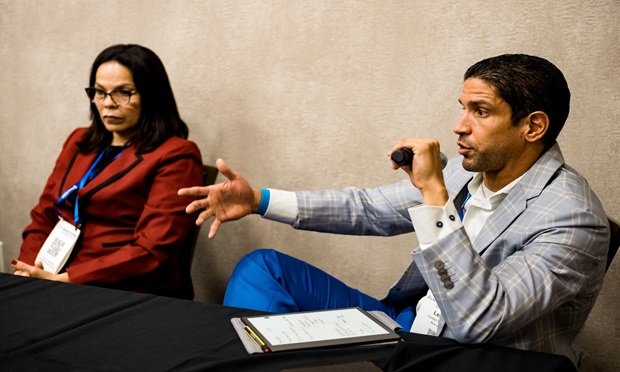A love-hate relationship with insurance makes business owners reluctant clients.
|On the hate side, they view money as a business tool, doingeverything possible to hoard it so it’s available to put towork.
|Unfortunately, insurance doesn’t make the cut. Even though theymay agree that it’s necessary, business owners often grumble whenthe premium payments are due. Then, when they have a loss, it’s adifferent story. That is when they can’t get in touch with theirinsurance agent fast enough to make sure they’re fully covered.
|Some producers understand this “Dr. Jekyll and Mr. Hyde”mindset of business owners, while others havenot figured it out, at least as yet. Perhaps they aren’t clearabout how business owners think, what makes them tick.
|The business owner’s mindset
While all business owners aren’t the same, many share similarcharacteristics. They tend to be sure of themselves, energetic,optimistic, forward-thinking, and fast-moving. Not easilydistracted, they’re focused on getting the job done now, so don’tbother them with problems, details, and fine print.
This is not all, business owners are usually quite skilled whenit comes to taking care of the upside of the enterprise — sales,motivating employees, keeping things moving, solving problems, andmanaging relationships.
|Why insurance is a low priority
More than just about anything else, owners want their business torun smoothly, although that’s only half the story. They don’t likedealing with anything that’s negative. It can drive them crazy.This includes even thinking about what they could lose, whetherit’s money, reputation, sales, customers, opportunities, or acompetitive advantage.
Given this scenario, it’s easy to see why insurance can ranknear the bottom of business owners’ priorities, just behind payingtaxes. They don’t like to spend time thinking about what can gowrong or what they can lose. Unfortunately, this is what insuranceagents are trained to do. Their job is focusing on exposures andcoverages, both of which have to do with potential losses. And toadd to the pain, insurance agents send bills.
|Related: 5 key facts about small business auto insurancecoverage
|All this can rub owners the wrong way, and, as they say, “makethe bad juices flow.” It explains why business owners can be lessthan welcoming when insurance agents call to make an appointment.As agents can attest, it’s not surprising for business ownerclients to be in the dark as to their policy’s provisions.
|A more successful approach
Here’s the problem, most agents irritate owners by focusing moreattention on coverages than they do on the businessitself. After the chit-chat, the agent asks for a copy ofthe declarations (dec) page, since it’s a ready-made shortcut topreparing a lower priced quote than the owner is paying now. But nomatter what anyone may say, insurance is about what can go wrong,not something owners like to focus on.
Yet, it’s the dec page that makes it easy for the agent. Justcopy and paste and you’re done. This reinforces an owner’s beliefthat the agent is just another salesperson, someone who wants theirmoney, just like a “no-good brother-in-law” who happens to be theirinsurance agent.”
|So, what’s an agent to do? It’s easy to start off bymisunderstanding how owners think about their business. They don’tthink of it as a job; they bond with it. It’s their pride and joy,where they’re personally invested. They care for it as they would amember of the family.
|Recommend ways to keep insurance costs down
Taking a positive approach can be a more successful strategy, onethat makes sense to owners and gets their attention. Instead oftalking about insurance, start off by suggesting that you wouldlike to review the operation, so you can recommend ways to keepinsurance costs down.
In other words, make this a “field underwriting” exercise. Itcan assist you not only in identifying potentially expensivelosses, but it gives you the data for suggesting ways to mitigaterisks to help keep costs down. This can be disarming to ownerssince you are performing a service, rather than asking for theirinsurance business.
|Related: Selling insurance to small business: Whay works,and what you should be trying
|Identifying possible exposures sends the right message: You knowhow to protect a business from loss and you see things other agentseither ignore or miss. In other words, you have value as aninsurance agent, someone who is worthwhile having around.
|Business owners will consider insurance as an irritating cost aslong as agents treat what they sell as a commodity. By doing so,they imply that all insurance is the same and all that matters isthe price, the lowest price. Nothing will change, however, unlessagents make insurance worth paying for by demonstrating their valueto businesses.
|John R. Graham of GrahamComm is a marketing and salesconsultant specializing in the insurance industry. He writes amonthly eNewsletter, “No Nonsense Marketing & Sales Ideas.”Contact him at [email protected] or617-774-9759.
Want to continue reading?
Become a Free PropertyCasualty360 Digital Reader
Your access to unlimited PropertyCasualty360 content isn’t changing.
Once you are an ALM digital member, you’ll receive:
- All PropertyCasualty360.com news coverage, best practices, and in-depth analysis.
- Educational webcasts, resources from industry leaders, and informative newsletters.
- Other award-winning websites including BenefitsPRO.com and ThinkAdvisor.com.
Already have an account? Sign In
© 2024 ALM Global, LLC, All Rights Reserved. Request academic re-use from www.copyright.com. All other uses, submit a request to [email protected]. For more information visit Asset & Logo Licensing.








